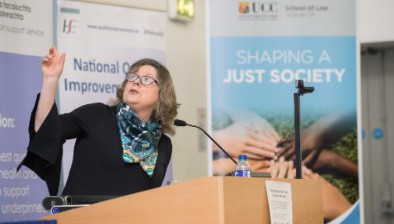Wardship system to be brought to an end today

The wards of court system will come to an end today with the long-awaited commencement of the Assisted Decision-Making (Capacity) Act 2015.
A core principle of the new Act is that all persons have the presumption of capacity and should be supported to make their own decisions as far as is possible. The Act emphasises minimal restriction of a person’s rights and freedoms and the importance of respect for will and preferences.
Key reforms include the abolition of the wards of court system for adults under the Lunacy Regulation (Ireland) Act of 1871, and the discharge of adults from wardship within three years. The Act will provide a new tiered framework of formal supports for those who need them, with supervision by the new Decision Support Service (DSS).
Estimates suggest that there could be as many as 220,000 people living in Ireland who have capacity-related difficulties and who may become users of the DSS.
The commencement of the Act also means that Ireland has now fully ratified the UN Convention on the Rights of Persons with Disabilities.
Taoiseach Leo Varadkar said: “The Decision Support Service is a progressive and far-reaching new state-run service that will benefit many people, particularly those who experience challenges in terms of their needs or decision-making abilities.
“The service will allow people to exercise more independence relating to their legal affairs and their future. It will provide assistance and assurance to a great many people and their families.”
Áine Flynn, director of the DSS, said: “We can all justifiably celebrate this morning, knowing that the Act has been commenced and the DSS is opening its doors. We now look forward to helping people access the new service and all of the supports set out under the Act.”
The Law Society of Ireland also welcomed the commencement of the Act.
Maura Derivan, president of the Law Society, said: “This is an important day for continuing recognition of the rights of citizens and the commencement of the 2015 Act represents a new era for legal capacity in Ireland.
“The 2015 Act focuses on assisting people to make decisions for themselves and puts in place a legal structure to allow vulnerable people greater control and autonomy over decisions relating to their own lives.
“The commencement of the 2015 Act means that Ireland now fully ratifies the Convention on the Rights of Persons with Disabilities. Article 12 of the Convention states that all persons with disabilities have the right to recognition everywhere as persons before the law and Article 13 mandates States Parties to ensure effective access to justice for persons with disabilities on an equal basis with others.”
She added: “The legislation has taken some time to be brought fully into force. It is very broad in its scope, repealing wardship, amending the law for the creation of enduring power of attorney, dealing with advance healthcare directives, and establishing the Office of the Director of Decision Support Services.
“Considerable amendments were made by the Assisted Decision-Making (Capacity) (Amendment) Act 2022, which has also delayed commencement.
“However, the time for progress is right now, and today is the day this begins. With this legislation, the new system will create a formal legal structure to support a person in their decision-making. This reflects a new approach and an essential modernising of our laws while ensuring respect for vulnerable citizens.
“We are encouraged by minister for justice Simon Harris and minister for children, equality, disability, integration and youth Roderic O’Gorman for their leadership in this area. We look forward to continuing to work alongside government, the Decision Support Service, and other stakeholders as the new system and provisions under the Act are implemented to ensure access to justice for all.”









